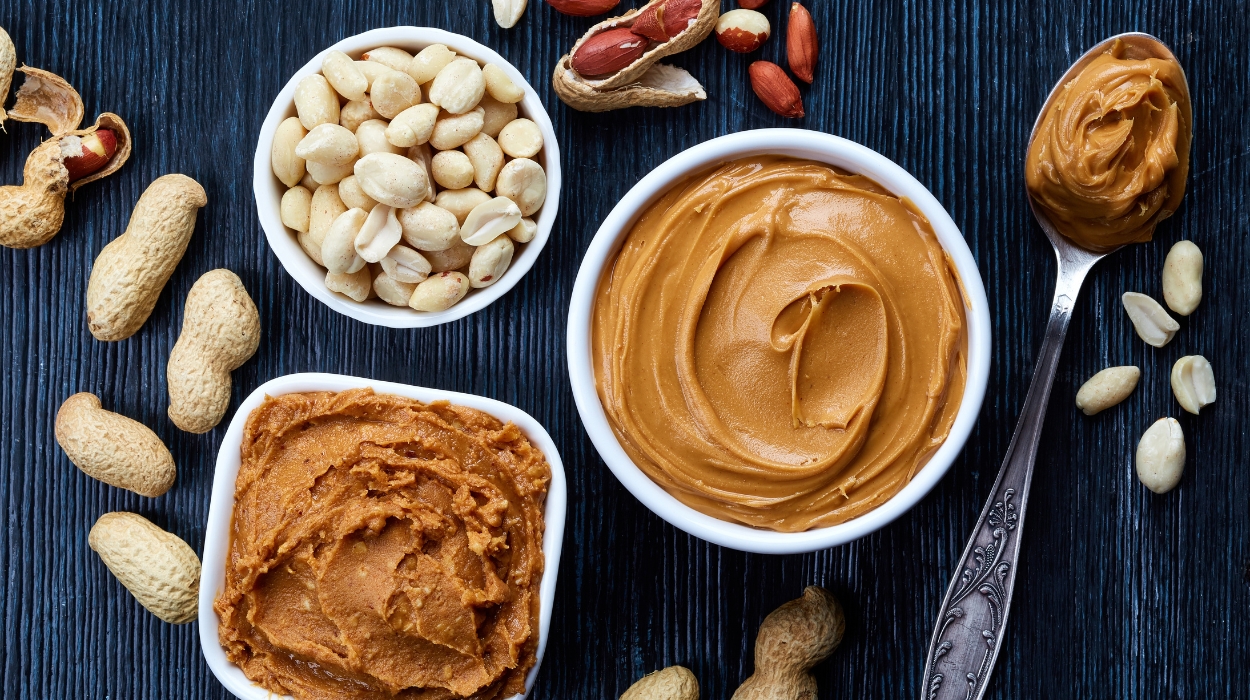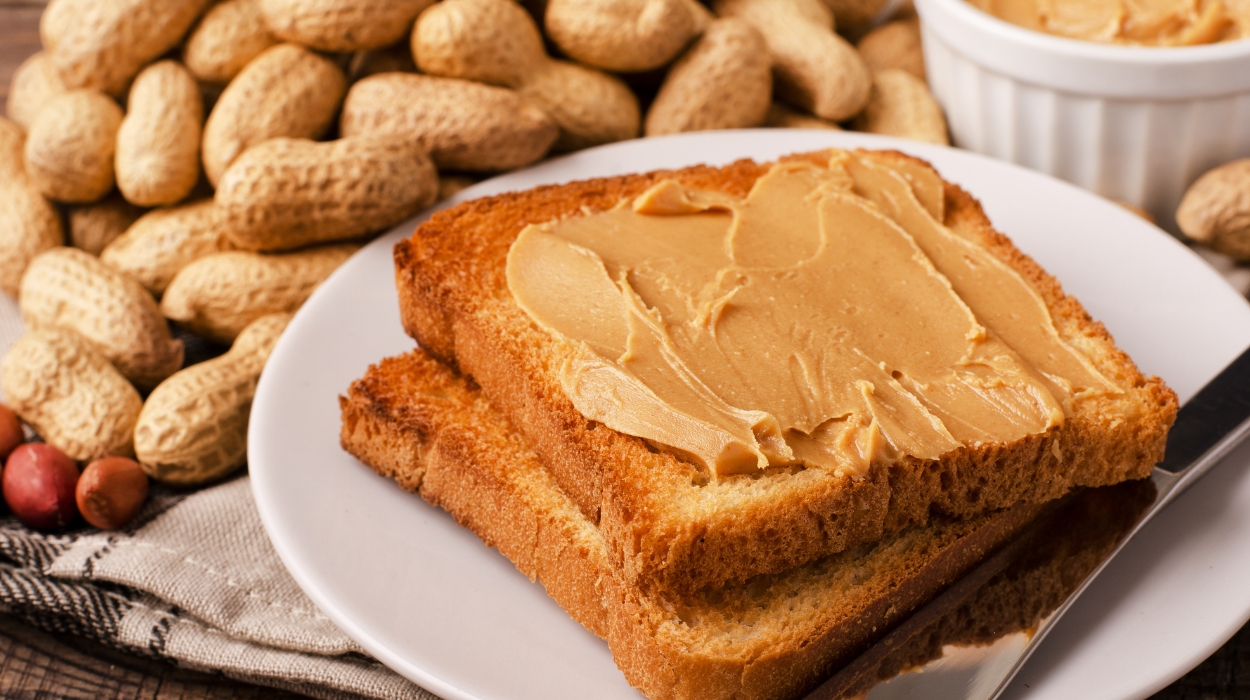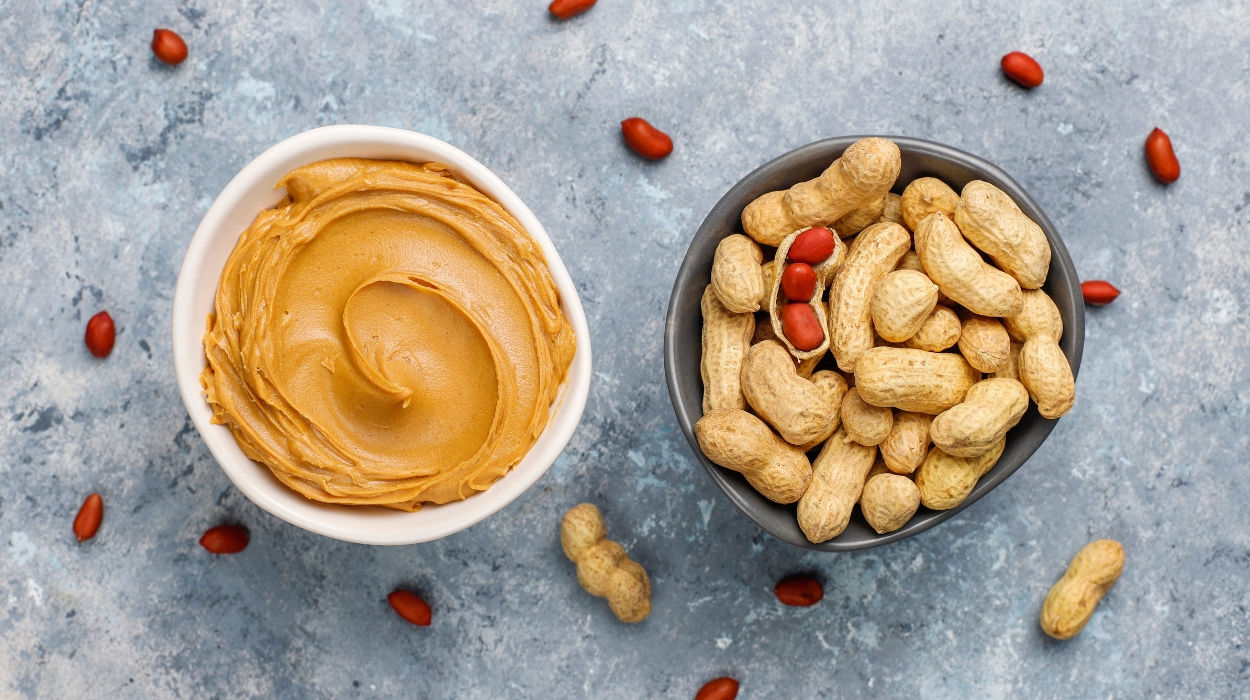Peanut butter tastes delicious. It’s rich, creamy, and savory. It’s full of nutrition and can be added to almost any food to increase its flavor.
You can find peanut butter in almost every pantry across America. But with it being such a beloved staple, you might ask yourself, is peanut butter good for you?
Even though this delicious spread is high in calories and fat, it is also brimming with protein and other beneficial nutrients for weight loss. This article explains whether peanut butter is a good weight loss choice and how to add it to your healthy eating plan today.
Is Peanut Butter Good Or Bad For You?
Given that peanut butter is high in calories and fat, you would think that eating peanut butter would cause you to gain weight. However, research proves peanut butter is good for weight loss.
Most research[1] shows a diet rich in nuts is better for maintaining a healthy weight than a low-fat diet; this is attributable to its high satiety, i.e., you’re fuller, sooner, and incomplete bioavailability of their actual calories. Additionally, studies[2] show that people with lower body mass indexes tend to ingest more peanuts and peanut butter than people with higher body mass indexes.
The reasoning as to why this occurs has yet to be understood entirely. Scientists think it might be because of how peanuts and peanut butter metabolize in the body. Some experts[2] believe that not all of the calories taken in by nuts can be fully processed and thus do not cause weight gain.
There is still a need for more research into the benefits of peanut butter and peanuts in managing weight. However, the bottom line is that eating peanuts and peanut butter has proven to help a person maintain a healthy weight.
Nutrition Facts
Peanut Butter Nutrition Facts provided by the United States Department of Agriculture[3]
Per 2 Tablespoons or 90 grams serving size:
- Calories: 190.
- Protein: 7 grams.
- Total Fat: 17.5 grams.
- Fiber: 3 grams.
- Carbohydrates: 7 grams.
- Magnesium: 54 milligrams.
- Phosphorus: 110 milligrams.
- Potassium: 180 milligrams.
- Vitamin E: 3 milligrams.
Health Benefits Of Peanut Butter

So why is peanut butter good for you? It’s loaded with nutrition and will keep you feeling fuller and more satiated than other foods. Read all about this and the other benefits of peanut butter below.
Nutrition
Peanut butter is filled with heart-healthy fats which are unsaturated fats. These fats are beneficial[4] for your cardiovascular health in a multitude of ways, such as:
- Improving cholesterol levels.
- Decreasing inflammation.
- Stabilizing heart rhythms.
- Maintaining cell health.
- Lowering the risk of premature death.
Besides unsaturated fats that are good for your heart, peanut butter also contains about 10 percent of your daily fiber needs. Unfortunately, less than 5% of Americans are thought to meet the daily recommended amount of fiber needed in their diet. The American Heart Association[5] recommends 25 grams per day of fiber for women and 38 grams for men.
Interestingly, fiber is additionally helpful for weight loss. High dietary fiber is associated with a lower body mass index and other benefits,[6] including:
- Normalization of bowel movements.
- Supporting bowel health.
- Controlling and maintaining healthy blood sugar.
- Lowering your risk of death and disease.
- Lowering blood cholesterol levels.
- Increasing satiety.
Satiety
Peanuts and peanut butter may help you lose a few pounds because they can leave you feeling more satiated compared to other types of foods. A study[7] from 2012 compared the differences in calorie consumption throughout the day between women who ate three tablespoons of peanut butter with their breakfast and those participants who did not. The peanut butter group reported feeling fuller throughout the day and consumed, on average, fewer calories than the non-peanut butter group.
Additionally, a clinical review[8] published in The American Journal of Clinical Nutrition showed that even though peanut butter is calorically dense, evidence indicates that it poses little threat to weight gain and may even aid in weight management. In the review, the scientists state this is due to feeling fuller after consuming peanut butter and the body’s inefficiency in absorbing the energy and calories found in peanut butter. A more recent review[9] supports this.
Also noted in the study are the nutritional contributions to a healthy diet that peanut butter provides, such as:
- Vitamins.
- Minerals.
- Antioxidants.
- Fiber.
- Unsaturated fats.
Protein
The high protein content of peanut butter can also help you to lose weight. Slightly less than 20 percent of calories from peanut butter come from protein.
Studies[10] show that eating protein helps with satiety and fullness and thus decreases your urge to continue eating, which can help with weight loss and reduce your desire to give in to cravings and mindless eating. A more recent 2020[11] study further supported that protein increases satiety signaling in the brain.
Adequate protein intake is also crucial for muscle growth and preservation. Metabolism is linked[12] to muscle mass. If you become inactive or lose muscle, your metabolism slows down and thus makes losing weight more challenging.
Thus, consuming foods rich in protein and a healthy diet might boost weight loss efforts more than a similar diet with little protein.
Interestingly, the protein in peanut butter can also be good for your hair. Your hair strands consist primarily of protein, and studies[13] have shown that lower protein diets promote hair loss. In addition, Biotin — vitamin H — another vitamin in peanut butter, helps with the production and growth of healthy hair.
Micronutrients And Antioxidants
Not only does peanut butter provide ample protein and healthy fats, but it also provides a vast and ample amount of micronutrients, such as:
- Vitamin B6.
- Folate.
- Magnesium.
- Niacin.
- Phosphorus.
- Vitamin E.
- Zinc.
These micronutrients provide a variety of different benefits for your body, such as:
- Heart health.
- Anti-inflammatory properties.
- Bone health.
- Healthy brain function.
Some micronutrients, such as magnesium, have particular benefits[14] to your body, such as normalizing blood sugar levels, migraine prevention, and supporting healthy blood pressure.
Also, niacin, another abundant vitamin found in peanut butter, helps[15] to control healthy blood cholesterol levels and blood sugar. Vitamin E, which is ample in peanut butter, is good for skin health because it helps to protect your skin barrier, which aids in maintaining moisture and, thus, the appearance of the skin.
The high amount of antioxidants found in peanut butter can be good for your liver health. The antioxidants fight off free radical damage, providing protective benefits for the liver.
Potential Side Effects
There are some excellent benefits to peanut butter when eaten in moderation. However, there are some potential drawbacks that you should consider before adding it to your diet.
High In Calories
Even though eating some peanut butter can be a good weight loss strategy due to its satiety, it’s always good to remember that you cannot eat all the peanut butter you want. If you are wondering how much is too much peanut butter, the general rule is to stick with one serving of healthy fat a day. In terms of peanut butter, one serving is equivalent to two tablespoons.
Also, consider what other foods you consume with peanut butter. As peanut butter contains mostly fat and protein, it’s best to pair it with fresh food lower in calories, such as apples, celery, or other fruits and vegetables.
Peanut Allergy
A peanut allergy, among the top five most common allergies[16] in the United States, can kill. Be very careful when consuming nuts, including tree nuts, or nut butter, as an allergic reaction typically will be seen within minutes of consuming the food. Also, any foods or supplements prepared in facilities not nut-free can expose an allergic person to residues that evoke the reaction. If you have any of these symptoms, call your healthcare provider immediately:
- Hives.
- Swelling.
- Difficulty breathing.
- Diarrhea.
- Nausea.
- Vomiting.
- Stomach cramps.
Choose Wisely
Be choosy when buying peanut butter, as not all have health benefits. For example, in the grocery store, you will find lots of peanut butter made with unhealthy additives such as added sugar and hydrogenated oils.
Hydrogenated oils contain something called trans-fats that you should avoid, because they are the fats most dangerous[17] to your health. Consumption of trans fats increases your “bad” LDL cholesterol while lowering your healthy HDL cholesterol levels. Several diseases are associated with eating these types of fats, such as:
- Heart disease.
- Stroke.
- Type 2 diabetes.
When choosing a peanut butter that is right for you, look at the nutrition facts label to ensure the product does not contain additional ingredients. The single component necessary for peanut butter is only peanuts. You might see salt added for extra flavor, but no other components are necessary.
Of note, natural peanut butter that does not contain additives typically will be separated when you open the jar into oil and peanut spread. This oil separation is entirely normal. When you first open the peanut butter, mix the oil into the smashed peanuts with a spoon or a knife and then refrigerate.
Ways To Add Peanut Butter To Diet

If you are on a weight loss journey and would like to include peanut butter in your diet, there are a few steps that will help aid in your efforts.
Portion sizes are essential to making sure you don’t overeat peanut butter. Consider measuring a serving — 2 tablespoons of nut butter — instead of just placing a couple of huge spoonfuls onto your plate or eating it out of the jar.
Another trick to try out is measuring the peanut butter, heating it up, and drizzling it over your snack. This will ensure a portion size goes a long way during snacking.
Furthermore, peanut powders are on the market now and provide many similar potential health benefits to peanut butter without the calorie or fat burden. Other ways to consume peanut butter include:
- Using it as a vegetable dip.
- Adding a serving to hot cereal.
- Drizzling some over yogurt.
- Using it as a fruit dip.
Of note, you can purchase either crunchy or smooth peanut butter.
The Bottom Line
Even though eating peanut butter is sometimes villainized for its high calorie and fat content, it can be a good weight loss tool that has many health benefits due to its ability to keep a person satiated. It’s also rich in macro- and micronutrients. Sticking to one serving size is the key to using peanut butter for weight loss.
Keep in mind that losing weight is a complicated endeavor and requires more than just adding peanut butter to succeed. A proper approach to losing weight includes exercise and a total dietary adjustment towards whole, non-processed foods. It might be challenging, but it is entirely possible. Also, remember that registered dietitians and physicians are ready and willing to help you on your journey.
